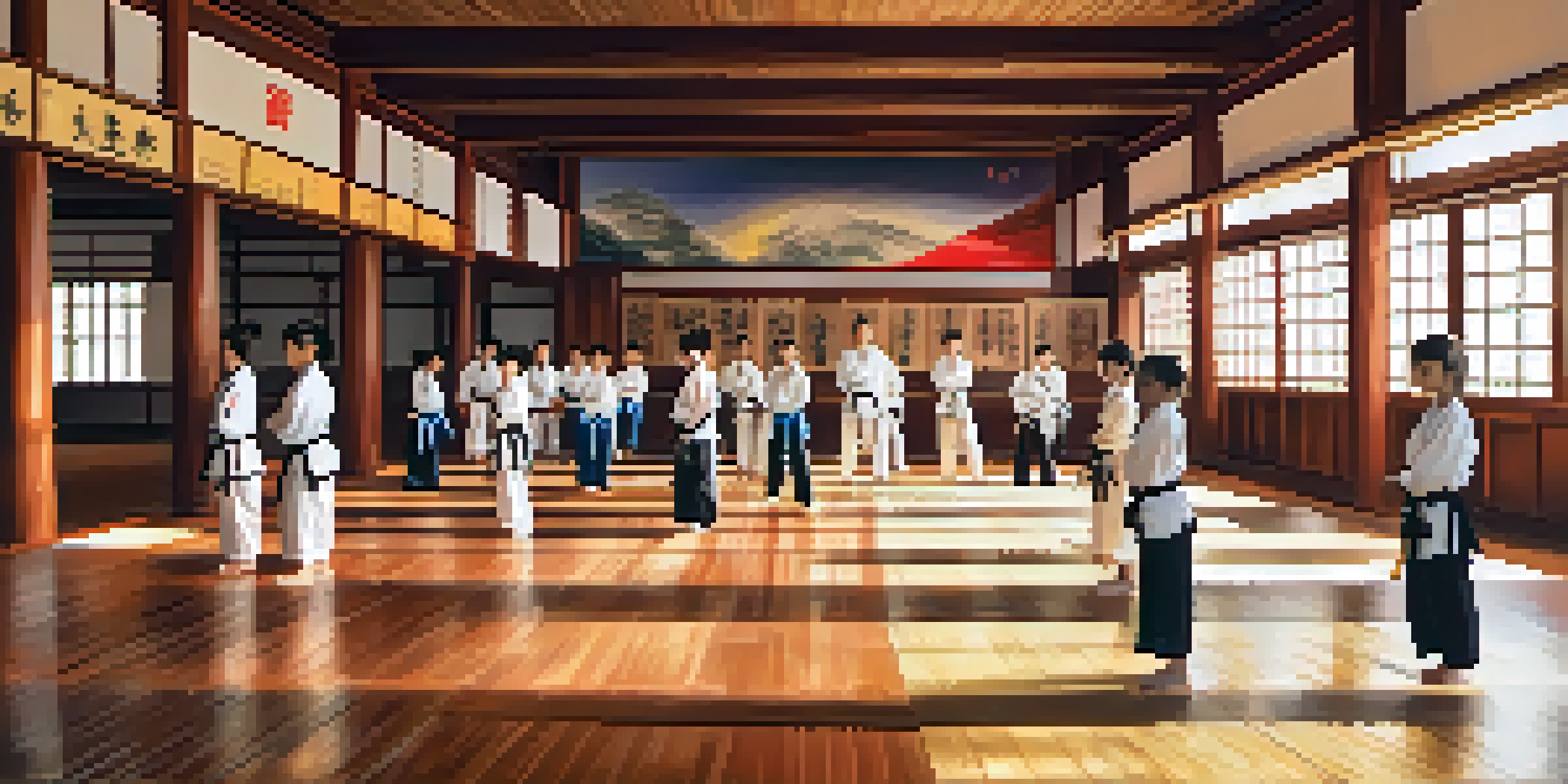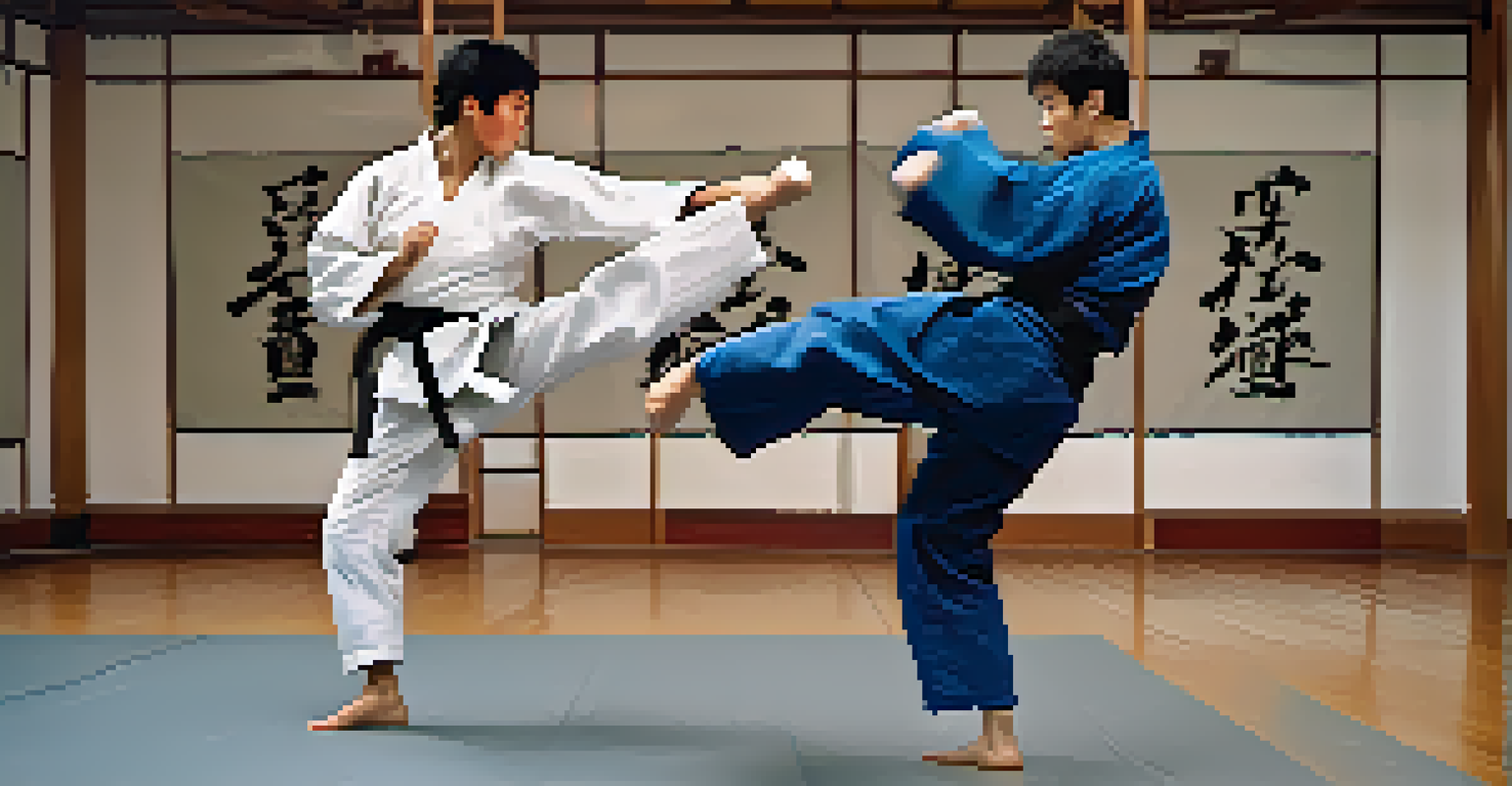Cognitive Skills Development Through Martial Arts Training

Understanding Cognitive Skills and Their Importance
Cognitive skills are the mental capabilities that help us process information, solve problems, and make decisions. These skills include attention, memory, reasoning, and perception, all of which are crucial for daily functioning. When we think of intelligence, we often think of these cognitive abilities, which can be developed and improved over time.
The mind is everything. What you think you become.
Martial arts training is often viewed through the lens of physical fitness and discipline. However, what many may not realize is that it also serves as a powerful tool for enhancing cognitive skills. By engaging in martial arts, practitioners not only learn techniques but also develop essential mental attributes that can benefit various aspects of life.
For example, a child learning karate might find that they can focus better in school, while an adult practicing judo may notice improved problem-solving skills at work. This dual benefit of martial arts training makes it a unique and valuable pursuit.
Enhancing Focus and Concentration Through Practice
One of the most significant cognitive skills developed through martial arts is focus. During training sessions, practitioners must pay attention to their instructor, movements, and surroundings. This heightened awareness fosters an ability to concentrate on tasks, both in and out of the dojo.

Practicing techniques like kata (a sequence of movements) requires intense concentration and memory recall. As martial artists repeat these forms, they train their brains to filter out distractions, which can lead to improved attention spans in everyday activities like studying or working.
Cognitive Skills Boosted by Martial Arts
Martial arts training enhances cognitive abilities such as focus, memory, and problem-solving through structured practice and mental engagement.
In essence, the repetitive nature of martial arts training helps to engrain focus into the practitioner's daily routine, contributing to better performance in academic and professional settings.
Building Memory Skills Through Technique Repetition
Memory plays a crucial role in martial arts, as students must memorize various techniques, forms, and strategies. This constant practice of recalling and executing movements enhances both short-term and long-term memory. As practitioners progress, they often find their ability to remember complex information improving.
Discipline is the bridge between goals and accomplishment.
For instance, a student preparing for a belt test must not only remember the physical techniques but also understand their applications and underlying principles. This multi-faceted learning process strengthens neural pathways associated with memory.
As a result, individuals who train in martial arts often experience improvements in their overall memory retention, benefiting their academic performance and everyday tasks.
Fostering Problem-Solving Skills in Dynamic Situations
Martial arts training often involves sparring, where practitioners must think quickly and adapt to their opponent's movements. This dynamic environment nurtures critical thinking and the ability to make quick decisions under pressure. As they practice, martial artists learn to assess situations rapidly and devise strategies for success.
For example, in a sparring match, a practitioner might need to evaluate their opponent's strengths and weaknesses while simultaneously executing their own techniques. This fast-paced problem-solving experience translates into real-world scenarios, such as navigating challenges at work or in personal relationships.
Emotional Growth Through Training
Practicing martial arts fosters emotional regulation and resilience, helping individuals manage stress and adapt to challenges in everyday life.
Thus, martial arts not only teaches physical skills but also cultivates an agile mind capable of overcoming obstacles in various aspects of life.
Enhancing Emotional Regulation and Resilience
Emotional regulation is another cognitive skill that martial arts training can significantly enhance. Practitioners learn to manage their emotions during high-pressure situations, such as sparring or competitions. This ability to stay calm and composed is crucial, as it enables individuals to think clearly and act effectively.
Through consistent training, martial artists also develop resilience, learning to accept failures and setbacks as part of the journey. For instance, a student might face challenges during a difficult technique but learns to persevere through practice and patience.
This emotional growth not only aids in martial arts but also equips individuals to handle stress and adversity in everyday life, ultimately leading to healthier mental well-being.
The Role of Discipline in Cognitive Development
Discipline is a fundamental principle of martial arts that plays a pivotal role in cognitive skills development. The structured environment of martial arts training encourages practitioners to set goals, follow routines, and maintain consistency. This discipline cultivates a mindset geared towards continuous improvement.
As practitioners adhere to their training schedules and strive to master new techniques, they learn the value of dedication and hard work. This commitment not only enhances physical skills but also fosters a growth mindset that can be applied to academic and professional pursuits.
Discipline Fuels Cognitive Development
The discipline learned in martial arts not only improves physical skills but also cultivates a growth mindset essential for academic and professional success.
In this way, the discipline acquired through martial arts serves as a cornerstone for developing cognitive skills, reinforcing the idea that mental and physical training go hand in hand.
Social Interaction and Collaboration in Martial Arts
Martial arts often involve working with partners or groups, which can significantly enhance social cognitive skills. Through activities like partner drills and group sparring, practitioners learn to communicate effectively, collaborate, and build camaraderie. These social interactions are vital for developing interpersonal skills.
As students engage with their peers, they practice empathy and understanding, which are essential components of emotional intelligence. This ability to connect with others can lead to stronger relationships both inside and outside the dojo.

Moreover, these social experiences foster a sense of community, empowering individuals to support one another in their training journeys, ultimately enriching their cognitive development.
Conclusion: The Holistic Benefits of Martial Arts Training
In conclusion, martial arts training offers a rich tapestry of benefits that extend far beyond physical fitness. The cognitive skills developed through this practice—such as focus, memory, problem-solving, emotional regulation, discipline, and social interaction—are invaluable in today’s fast-paced world. By engaging in martial arts, individuals not only enhance their mental agility but also cultivate a well-rounded approach to personal growth.
Whether you're a child learning the basics or an adult refining your skills, martial arts provides a unique environment for cognitive development. Each kick, punch, and kata is a step towards building a sharper mind and a more resilient spirit.
So, if you’re looking to boost your cognitive skills while enjoying a fulfilling physical activity, martial arts might just be the perfect fit for you.